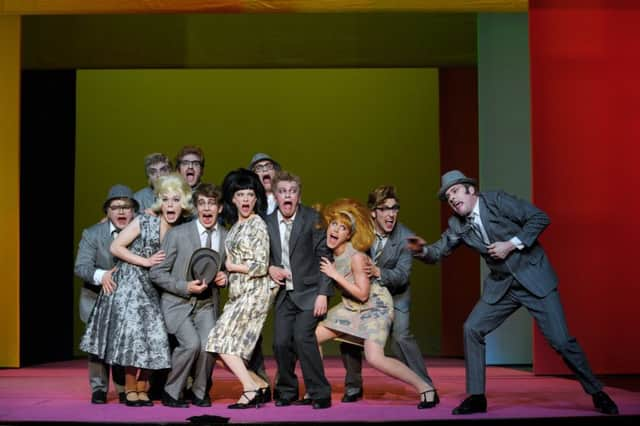Theatre review: Murmel Murmel, Edinburgh


THEY say that it’s the lexical richness of our language that makes us human and sets us apart from other species; the sheer quantity and range of the thousands of words we can put together, using the basic sounds of the alphabet.
Anyone who has seen Herbert Fritsch’s astonishing Berlin Volksbuhne production of Murmel Murmel, though, might well be tempted to disagree. This 176-page text by the Swiss-born avant-garde artist and experimentalist Dieter Roth consists only of the single word “murmel” – the German equivalent of the “rhubarb” used by English-speaking actors to create a general hubbub of voices on stage – repeated thousands of times, and has generally been regarded as unstageable, or as “the most boring play in the German language”.
Advertisement
Hide AdYet over an inspired 80 minutes, Fritsch takes this impossible piece of work, and transforms it into an extraordinary essay in human communication and self-recognition. The secret of the show’s success lies in at least four areas. There are the 12 magnificent, intensely physical actors who make up Fritsch’s company: performers of all sizes and shapes, every age and various sexes, who sing, talk, leap, yodel, fall into the orchestra pit, or murmel their way through operatic arias.
There’s the pinpoint precision of their vocal performance, both spoken and sung, solo and choral, as conducted from the orchestra pit by a harassed-looking figure in uniform. There’s Fritsch’s own dazzling stage design of huge multi-coloured sliding screens that, as the show continues, almost become an extra character in the play.
And there’s the sheer style of the production which, at its height, achieves a hilarious and liberating collision between avant-garde Dadaism and absurdism at its most extreme, and the kind of retro-suburban Harry-Worth-like comedy that effortlessly links the absurd to pure popular entertainment and slapstick.
Some sequences – particularly the brilliant opening half hour – are perhaps more successful than others; I found less interest in the section where the cast appear as romping primary-coloured Teletubbies, in whole-body leotards.
At a point in the International Festival where many people in Edinburgh are scarcely able to do more than mutter “murmel murmel” themselves, though, Fritsch’s brilliantly-staged show – which has been acclaimed across Europe – was cheered to the echo at the King’s: for its imaginative wildness, its artistry, its joie de vivre, and its astonishing virtuoso curtain-call, which almost amounts to an entire new production in itself.